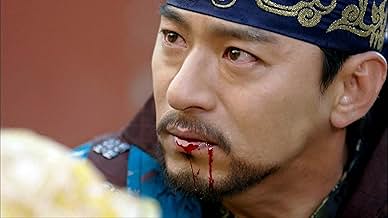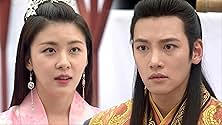A Korea-born warrior girl had to be a servant at the Mongol Yuan court but somehow overcame her low status to become an empress in another land.A Korea-born warrior girl had to be a servant at the Mongol Yuan court but somehow overcame her low status to become an empress in another land.A Korea-born warrior girl had to be a servant at the Mongol Yuan court but somehow overcame her low status to become an empress in another land.
- Awards
- 5 wins & 17 nominations total
Browse episodes
Featured reviews
I am a recent convert to Korean television - won over by Mr Sunshine and Crash Landing on You, both of which I thought were simply wonderful.
So I came to this with high hopes, bolstered by the score on IMDb. Initially I was disappointed, finding Ha Ji-Won's disguise as a tough male bandit stretching credibility too far. But the series really starts to improve when she is discovered to be a woman and is forcibly taken to the imperial palace.
From that point on Ha Ji-Won is compelling. Her transformation through the crucible of intrigue and tragedy into a woman of power is utterly believable and drives the story forwards. The pace never lets up with plots and counter-plots whirling around as a lowly tribute woman fights for revenge, survival and those that she loves.
So, while I cannot place this alongside Mr Sunshine and Crash Landing on You, I did enjoy it a great deal.
So I came to this with high hopes, bolstered by the score on IMDb. Initially I was disappointed, finding Ha Ji-Won's disguise as a tough male bandit stretching credibility too far. But the series really starts to improve when she is discovered to be a woman and is forcibly taken to the imperial palace.
From that point on Ha Ji-Won is compelling. Her transformation through the crucible of intrigue and tragedy into a woman of power is utterly believable and drives the story forwards. The pace never lets up with plots and counter-plots whirling around as a lowly tribute woman fights for revenge, survival and those that she loves.
So, while I cannot place this alongside Mr Sunshine and Crash Landing on You, I did enjoy it a great deal.
Ji Chang Wook is definitely the star. He goes from a total loser in the beginning and then to a strong lead and then to crazy fellow later. Amazing! You would truly feel his pain and love.
All the actors/characters here do so well! From the female lead, to the generals, villains to the eunuchs and lead maids in waiting, all so good!
Plus the plot is so captivating. Right to the very end.
👏👏👏👏👏👏
All the actors/characters here do so well! From the female lead, to the generals, villains to the eunuchs and lead maids in waiting, all so good!
Plus the plot is so captivating. Right to the very end.
👏👏👏👏👏👏
I wonder why Mr. Sunshine is rated higher but this is the BEST K-DRAMA EVER!
Nevermind the episodes because you'll even want for more. You'll never get bored.
Every episode is thrilling.
This series made Ha Ji Won and Ji Chang Wook on top. This series will make you feel all the emotions - sad, angry and laugh.
Must watch.
I am an Iranian. This was one of the finest K-Drama Historical TV shows. It actually leveled up my expectation from other series too. I'm looking forward to watch more good series. Thanks for all efforts.
P.S: In my opinion, The Ending of this series could have been made much better. but, It's still fantastic.
P.S: In my opinion, The Ending of this series could have been made much better. but, It's still fantastic.
Actress Ha Ji Won is amazing as a super tough, smart, and beautiful woman who fights her way from slavery to the pinnacle of power in China. One by one, she demolishes powerful enemies using strategy rather than brute force, until there is no opponent left alive. Both the King of Korea, and the Emperor of China fall madly in love with her, and compete to protect her and advance her cause. Ha Ji Won delivers a tour de force performance. I can't think of another role in cinema featuring such a powerful female character. Loosely based on a true story, this is k-drama at its best.
Did you know
- TriviaIn the original Korean version the characters don't have names of the real historic figures. In the subtitled English version most of the characters are given the names of real historic figures by the subtitles authors.
- SoundtracksThorn Love
Performed by 4MEN
- How many seasons does The Empress Ki have?Powered by Alexa
Details
- Release date
- Country of origin
- Official site
- Language
- Also known as
- Empress Ki
- See more company credits at IMDbPro
- Color
Contribute to this page
Suggest an edit or add missing content





















